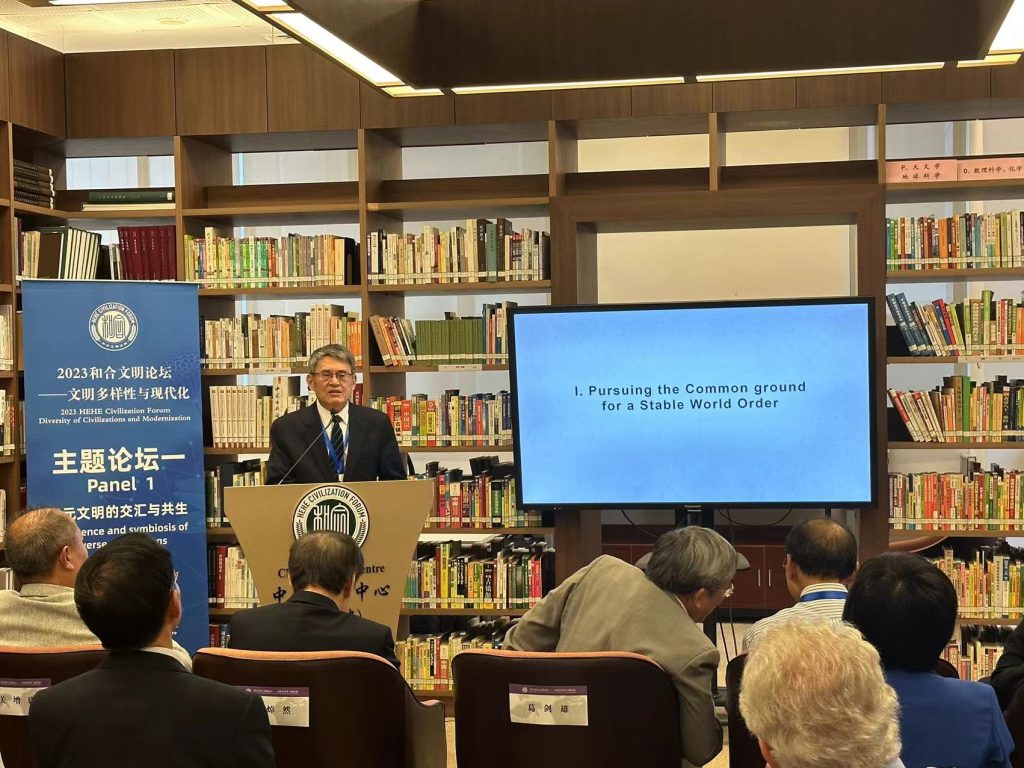
Dr. Ming Dong Gu, the Katherine R. Cecil professor in foreign languages and professor of comparative literature, represented the Harry W. Bass School of Arts, Humanities, and Technology at The University of Texas at Dallas in the international stage.
Dr. Gu, who teaches literature at the Bass School, served as keynote speaker at two recent international conferences: the Conference of the International Confucian Association on Sept. 8 in Singapore, and The Ninth Convention of the Chinese-American Association for Poetry and Poetics (CAAP) on Oct. 20 in Wuhan, China.
The Singapore conference was held in celebration of the 30th anniversary of the International Confucian Association and the centenary of the birth of Mr. Lee Kuan Yew, former Prime Minister of Singapore and Honorary Chairman of the Association. The event was attended by a lineup of dignitaries and renowned scholars including Fukuda Yasuo, Chairman of the International Confucian Association and former Prime Minister of Japan and Roger T. Ames, Humanities Chair Professor of Peking University and former editor of Philosophy East and West.
The International Confucian Association invited Dr. Gu to their convention, which focused on the Diversity of Civilizations and Modernization. The conference aims to promote global intercultural dialogue and mutual understanding while carrying forward the shared values of humankind. At the conference, Dr. Gu argued that the Confucian way of tolerance may serve as an ethical key to building a world order of harmony and cooperation.
At the CAAP Conference, Dr. Gu gave a virtual keynote presentation on how the conception of literature has evolved in history and across cultures and how to cope with the shifting landscape of literary studies. His talk focused on the work of ancient Chinese thinker Liu Xie and French philosopher and historian Michel Foucault and located a concentric logic for the development of the humanities in general.
“Liu Xie’s poetics and Foucault’s archaeology of the humanities contain an inner logic for all writings and humanities, affords us precious insights for a re-conception of literature and a re-consideration of its nature, function, and creative process, and may empower us to come up with strategies to confront the challenges of technological advance and meet the popular demand of literature, not in its narrow sense, but in its broadest possible sense,” Dr. Gu’s outline states.

CAAP is an international academic organization of leading scholars focused on the scholarship and translation of international poetry, specifically of North American poetry in China and Chinese poetry in North America, headquartered at the Center for Programs in Contemporary Writing of the University of Pennsylvania.
Hosted by the CAAP, the conference took place at the School of Foreign Languages of the Central China Normal University in China. CAAP is composed of scholars and poets from America, China, and other parts of the world. It is chaired by Marjorie Perloff, professor emerita at Stanford University, Charles Bernstein, professor at the University of Pennsylvania, and Nie Zhenzhao, professor emeritus of Central China Normal University and vice president of the China National Association of Foreign Literature. In his keynote address, Professor Bernstein discussed a poem by the German poet Goethe and analyzed an English version translated by two UT Dallas’s professors, Frederick Turner, Founders Professor Emeritus and Zsuzanna Ozsváth, Leah and Paul Lewis Chair Emeritus of Holocaust Studies.